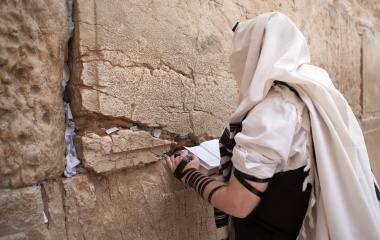
We have often noted the refreshing openness of our Sages. They tell it as it is, and made no efforts to cover up the foibles or even sins of their colleagues. They were wont to offer sharp critique, and were never afraid to express their views openly. Politically incorrect ideas were not censored, moral failings not hidden. Sexual discussions abound, often in ways that would earn the Talmud an R rating in Hollywood. This should not surprise us; the Torah is a Torah of truth and deals with all aspects of life, imposing a duty upon our Sages to discuss anything and everything, offering moral guidance in all areas of life.
Nonetheless, every once in a while (at least for those who learn Daf Yomi), we come across a discussion that leaves us shaking our heads in amazement.
“When Rav came to Darshis, he would announce: ‘Who will be mine for a day?’ When Rav Nahman would come to Shachnetziv he would announce: ‘Who will be mine for a day?’” (Yoma 18b).
This cryptic announcement is no longer cryptic once one reads the Talmudic discussion on this announcement. “But we learned in a braitta that Rabbi Elazar ben Yaakov said: A man should not marry a woman in one state, and go and marry another woman in a different state”. As Rashi explains, what Rav and Rav Nachman were seeking was someone they could marry for a day while they were in town, and divorce immediately thereafter. Compounding our moral outrage (I hope) is the fact that what bothered the Gemara was not the idea of marrying for a day, but the fear that should the wife become pregnant and have a child who might then grow up and marry his or her half sibling, thereby “filling the entire world with mamzerim”.
As one might expect, our commentaries struggled greatly with this passage. The Soncino Talmud translation—unlike its successors, ArtScroll and Koren—very rarely offers more than a passing reference or clarification. But this Gemara is an exception. Basing themselves on Rashi (Avodah Zara 76b s.v. mai avdat b'orta), they write:
“This strange statement, completely contradicted by the saintly character of both Rav (v. Eruvin. 100a, Haggigah 5a, Ketubot 48b, Sanhedrin 76a) and Rav Nachman, has been explained through an account in Bavli [Avodah Zara] 76b. King Shapur entertained two guests, Bati bar Toba and Mar Judah. In accordance with Persian custom, he "honoured" them by sending to each a concubine. This gift was rejected by Mar Judah, but accepted by Bar Toba. Rav and Rav Nachman, as leaders of their people would find themselves similarly embarrassed by such attention, on the occasion of their official visits to Persian cities. Some princes are known to have taken the refusal of their "gift" as a serious affront. In order to avoid complications, these Rabbis hit upon the device of declaring themselves married, i.e., provided with a wife in the city they visited, going to the length of marrying "for a day" the local wife, thus helping them to escape the royal "gift".
This explanation—one (hopefully) foreign to us but sadly, not unheard of—explains why this declaration was made only when the rabbis visited the Persian cities of Darshis and Shachnetziv but nowhere else[1].
The Ben Ish Chai wonders why Rav and Rav Nachman would declare aloud their desire to marry for a day. Did they not care about the loss of dignity this would cause? He argues that the actions of the rabbis were meant to teach the importance of marriage to the people of Darshis and Shachnetziv, who tended to marry very late in life. With the Talmud arguing that every day one remains unmarried beyond the age of 20 is a day spent in sin—or at least, a day spent thinking about sinning (Kiddushin 29b)—Rav and Rav Nachman wanted to send a strong message about the importance of getting married. They were willing to have their honour denigrated with this coarse announcement, “in order to bring merit to the people and separate them from sin”. While such behaviour is unbecoming to anyone, and all the more so to great rabbis, they wanted to “awaken the hearts of the people”. "If these great Sages, who are engaged in Torah day and night , are holy [people] and are married and nonetheless even they are afraid that they might have a seminal emission and do not want to spend even a few days unmarried, how much more so and more so, we young, single people whose desires are very strong, must not delay marriage due to the prohibition of seminal emission. And this action makes a ten times greater impact than words of chastisement and rebuke.”
It is precisely because such a declaration is so unbecoming that it could be impactful. Unbecoming, but Rav and Rav Nachman were willing to do for the greater good. Great rabbis are willing to look bad so others can look good. With people in other cities getting married at a younger age, it was only in Darshis and Shachnetziv that this declaration was necessary.
Yet neither Rashi, nor Rabbeinu Chananel, nor the Tosafists (i.e., the commentaries on the Talmudic page) comment on the morality or lack thereof of this story. Apparently, they saw little strange or morally problematic with this declaration. It is, as far as I can tell, only more modern commentators who raise these issues. This, I might suggest, reflects changing social mores.
According to Torah law, a man was allowed to marry many wives. While this may be anathema to our moral compass, the ancient world viewed this much differently. They saw little wrong with temporary marriages of convenience. Yet despite this allowance, there is not even one known case of our Talmudic Sages marrying more than one wife. Just because the Torah allows it does not mean it’s a good idea. And what was allowed, but generally not practiced, eventually was prohibited—for Ashkenazim over 1,000 years ago, and for Sephardim, since the creation of the State of Israel. But before it was technically banned, there may have been exceptions, this being one of them.
Contrary to what many think—that great Sages have conquered their evil inclination—our Sages teach that, “whomever is greater than his friend, his inclination [to sin] is also greater” (Sukkah 52a). Travel in the ancient world was very slow. We still observe two days of Yom Tov in the diaspora because it took more than two weeks to travel one way from Jerusalem to Bavel. I do not know how far the cities of Darshis and Shachnetziv were from home, but presumably a trip there and back took some time. Perhaps the Gemara is noting that, due to the long time they were away from home, they were afraid of sinning and hence, a marriage for a day was the preferred option—one entered into voluntarily and viewed much differently than today[2][3]. We may cringe at such an understanding, and such may not reflect ideal behaviour in any era, but in its historical context, it can be understood to reflect that even the greatest of rabbis are human too.
While written in a specific historical context, Talmudic stories, like those in the Torah, are not written for the historical record. They are recorded for posterity for the messages they teach. They are often purposefully ambiguous, allowing and demanding various interpretations. A powerful message in one generation may have no resonance in another, or may take on added significance in another. Whether or not the Talmud, in reporting this story, is being critical of the rabbis is almost besides the point. In the world in which I live, no one would argue that this is to be emulated. But it raises important questions with which to grapple. What ethical norms must be fixed and unchanging, and which reflect the ethos of the times? How can we relate to stories and events that seem so foreign to us? Can we judge the people of yesteryear based on the norms of today? Should we expect our rabbinic leaders to be so different from us? Should rabbinic leaders openly discuss their personal struggles? That is a lot to think about for one night.
[1] Fascinatingly, this is the last piece of Gemara in masechet Avodah Zarah. In editing the Talmud, it appears that our Sages wanted to stress the connection between idolatry and immorality. The fundamental issue with idolatry is not the fact that their conception of G-d is incorrect. Rather, it is the severing of the link between G-d and morality. This link was first explicitly made by Avraham Avinu; when explaining why he claimed Sarah was his sister, he told Avimelech, “For I said, 'Surely, there is no fear of God in this place, and they will kill me because of my wife” (Breisheet 20:11). Even the Rambam—who considers one who is a well-meaning and morally upstanding person but is theologically mistaken as an idolater—does not deny the link between belief in a true G-d and morality.
[2] Scholars note that one of the reasons for the cherem of Rabbeinu Gershom forbidding two wives was to prevent the scenario of a husband going on a long business trip, marrying during his journeys, and abandoning his first wife.
[3] When reading this story about Rav, I could not help but be reminded of another rather amazing Talmudic story that may, or may not, shed some light on our story. “Rav Kahana entered and lay beneath Rav’s bed. He heard Rav chatting and laughing with his wife, and seeing to his needs. Rav Kahana said to Rav, ‘The mouth of Abba, [Rav] is like one whom has never eaten a cooked dish’. Rav said to him: ‘Kahana, you are here? Leave, as this is an undesirable mode of behavior!’ He said to him: ‘It is Torah, and to learn, I must’” (Brachot 62a).



